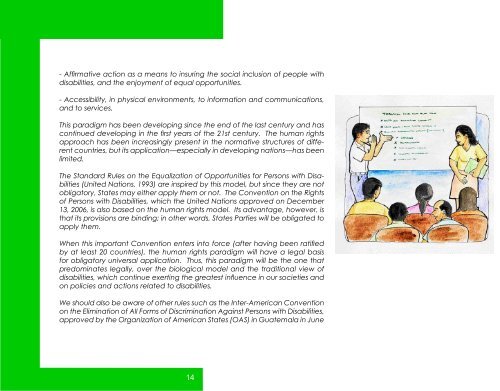in English - Handicap International
in English - Handicap International
in English - Handicap International
Create successful ePaper yourself
Turn your PDF publications into a flip-book with our unique Google optimized e-Paper software.
- Affirmative action as a means to <strong>in</strong>sur<strong>in</strong>g the social <strong>in</strong>clusion of people with<br />
disabilities, and the enjoyment of equal opportunities.<br />
- Accessibility, <strong>in</strong> physical environments, to <strong>in</strong>formation and communications,<br />
and to services.<br />
This paradigm has been develop<strong>in</strong>g s<strong>in</strong>ce the end of the last century and has<br />
cont<strong>in</strong>ued develop<strong>in</strong>g <strong>in</strong> the first years of the 21st century. The human rights<br />
approach has been <strong>in</strong>creas<strong>in</strong>gly present <strong>in</strong> the normative structures of different<br />
countries, but its application—especially <strong>in</strong> develop<strong>in</strong>g nations—has been<br />
limited.<br />
The Standard Rules on the Equalization of Opportunities for Persons with Disabilities<br />
(United Nations, 1993) are <strong>in</strong>spired by this model, but s<strong>in</strong>ce they are not<br />
obligatory, States may either apply them or not. The Convention on the Rights<br />
of Persons with Disabilities, which the United Nations approved on December<br />
13, 2006, is also based on the human rights model. Its advantage, however, is<br />
that its provisions are b<strong>in</strong>d<strong>in</strong>g; <strong>in</strong> other words, States Parties will be obligated to<br />
apply them.<br />
When this important Convention enters <strong>in</strong>to force (after hav<strong>in</strong>g been ratified<br />
by at least 20 countries), the human rights paradigm will have a legal basis<br />
for obligatory universal application. Thus, this paradigm will be the one that<br />
predom<strong>in</strong>ates legally, over the biological model and the traditional view of<br />
disabilities, which cont<strong>in</strong>ue exert<strong>in</strong>g the greatest <strong>in</strong>fluence <strong>in</strong> our societies and<br />
on policies and actions related to disabilities.<br />
We should also be aware of other rules such as the Inter-American Convention<br />
on the Elim<strong>in</strong>ation of All Forms of Discrim<strong>in</strong>ation Aga<strong>in</strong>st Persons with Disabilities,<br />
approved by the Organization of American States (OAS) <strong>in</strong> Guatemala <strong>in</strong> June<br />
14

















